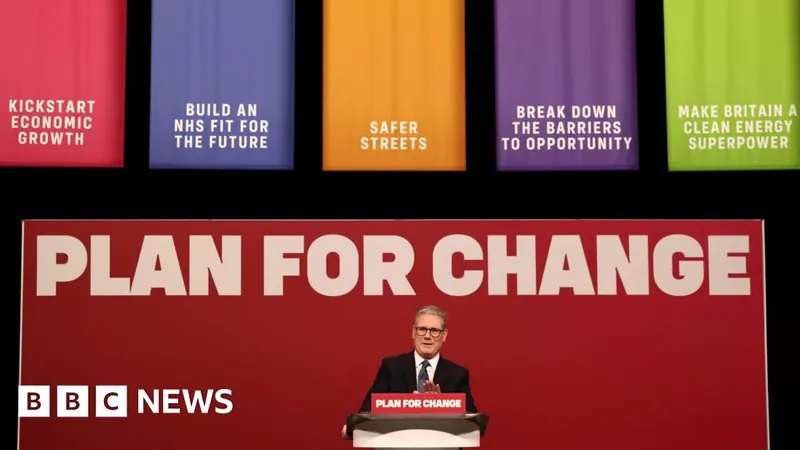
Six Key Takeaways from Keir Starmer’s Vision for Change Ahead of the 2029 Election
2024-12-05
Author: Ken Lee
The Six Milestones: What You Need to Know
Starmer outlined a series of objectives centered on improving various sectors across the UK. Importantly, the expectations related to housebuilding, NHS waiting times, and school readiness are specific to England, while initiatives concerning clean energy and household income are applicable nationwide. Below are the six key milestones:
1. Boosting Household Income
Starmer aims to enhance the financial wellbeing of working families.
2. Housing Revolution
The government plans to construct 1.5 million homes and expedite planning permissions for at least 150 significant infrastructure projects, tackling the housing crisis head-on.
3. NHS Improvements
The goal is to ensure that 92% of NHS patients are treated within an 18-week timeframe, alleviating long waiting times that have plagued the system.
4. Increased Police Recruitment
A commitment to recruit 13,000 additional police officers and community support officers will help strengthen neighborhood safety in England and Wales.
5. Early Childhood Education
By 2029, the aim is for three-quarters of five-year-olds to be ready for school, addressing educational preparedness at a crucial age.
6. Transition to Clean Energy
Sir Keir stresses the importance of reaching 95% clean power by 2030, aligning with broader environmental goals and addressing climate change.
Clarifying Missions vs. Milestones
Understanding the framework of Starmer’s plan can be complex. The six milestones serve as measurable objectives set against his previously defined missions, including creating a resilient NHS. These missions are intended to guide civil servant priorities and actions.
On Clean Power: A Key Debate
During his speech, Starmer reiterated the aim for 95% clean power by 2030. This marks a nuance from previous promises of "zero carbon electricity by 2030" outlined in Labour's manifesto. While he clarified the definition of "clean power," indicating that a mix of energy sources would continue to exist, questions remain around the feasibility and clarity of these commitments as the Labour party navigates electoral expectations.
Civil Service Accountability
Starmer’s speech was particularly critical of the civil service, asserting that many within Whitehall have become too complacent, stating they were "comfortable in the tepid bath of managed decline." He emphasized that profound change is necessary, asserting his intent to revolutionize government operations to better deliver public services.
Migration Policy on the Backburner
Interestingly, immigration policies did not make it onto Starmer's list of milestones, despite persistent inquiry from reporters. He assured that measures would be implemented to tackle both legal and illegal migration but refrained from providing specific metrics or targets, suggesting that reform in this area is a fundamental duty of any government.
Assessing Economic Growth
Labour continues to pursue a high growth trajectory for the UK, aiming for the highest sustained growth in the G7. However, rather than focusing solely on raw economic data, Starmer is pivoting to metrics that resonate with everyday citizens, such as "real household disposable income." While he is optimistic about improvements in this area, some critics argue that without specific targets, it remains an ambiguous measure of success.
As the Labour Party gears up for a pivotal election cycle, the roadmap laid out by Sir Keir Starmer may very well set the tone for the future of the UK. The next few years will undoubtedly serve as a critical testing ground for these ambitious goals. Stay tuned, as the political landscape continues to evolve, promising both excitement and uncertainty in the run-up to 2029!

 Brasil (PT)
Brasil (PT)
 Canada (EN)
Canada (EN)
 Chile (ES)
Chile (ES)
 España (ES)
España (ES)
 France (FR)
France (FR)
 Hong Kong (EN)
Hong Kong (EN)
 Italia (IT)
Italia (IT)
 日本 (JA)
日本 (JA)
 Magyarország (HU)
Magyarország (HU)
 Norge (NO)
Norge (NO)
 Polska (PL)
Polska (PL)
 Schweiz (DE)
Schweiz (DE)
 Singapore (EN)
Singapore (EN)
 Sverige (SV)
Sverige (SV)
 Suomi (FI)
Suomi (FI)
 Türkiye (TR)
Türkiye (TR)